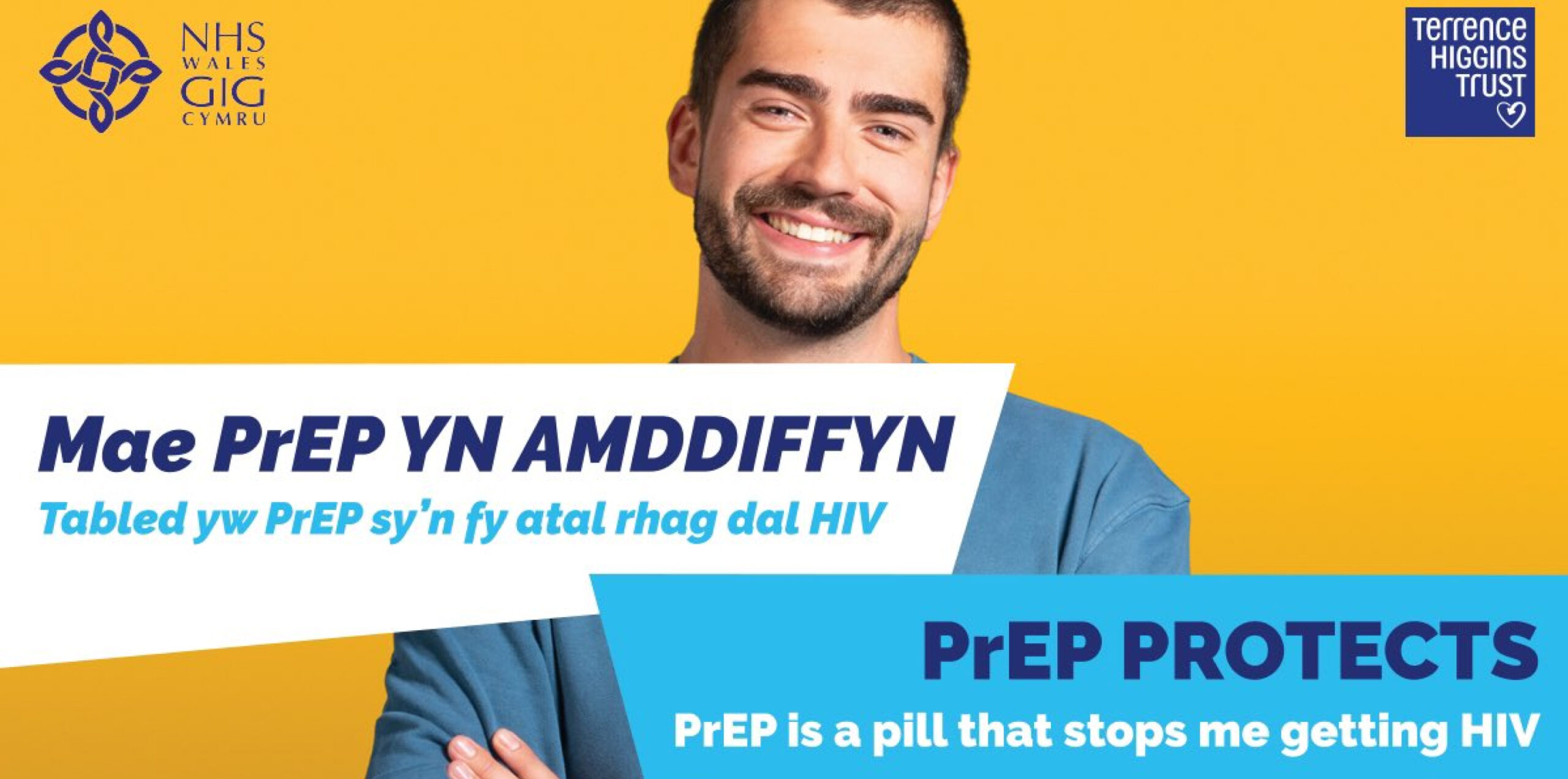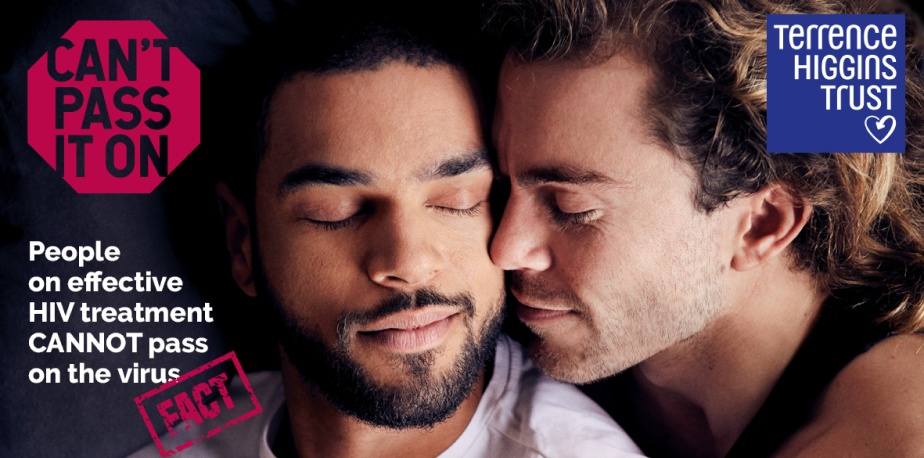Campaigns
PrEP Protects Wales

In 2023, Terrence Higgins Trust, Public Health Wales and NHS Wales ran a nationwide partnership campaign on PrEP (pre-exposure prophylaxis). The campaign explained how the drug can be used to prevent HIV and where to access it in Wales. Digital screens and a social media campaign across the country took our message to the Welsh people, in both English and the medium of Welsh,
PrEP is a drug taken by HIV-negative people before and after sex that reduces the risk of getting HIV.
What is PrEP?
PrEP is pill that contains drugs used to treat HIV. It is taken by HIV-negative people to reduce their risk of becoming infected with HIV. Since summer 2018, NHS Wales has prescribed Teva, the generic brand of the drug used for PrEP (emtricitabine and tenofovir disproxil).
Has there been an increase in HIV transmission in Wales?
The majority of infections diagnosed in Wales are sexually transmitted. Nearly half of diagnoses since 2011 were attributed to infections acquired through sex between men while nearly a third were likely from heterosexual sex.
There is a steady increase in the number of people living with HIV in Wales, reflecting both an increase in survival due to effective treatment and new diagnoses.
How does PrEP work?
If you take PrEP and are exposed to HIV, PrEP prevents HIV from entering your cells and replicating and you should remain HIV negative. PrEP needs to be taken correctly to be effective, ensuring there is enough of the drug in your blood before you are exposed to HIV. In most big PrEP studies, no one became infected if they took PrEP as recommended. But if you don’t take it correctly, it may not work.
Should I consider taking PrEP?
PrEP is for HIV-negative people who are at increased risk of contracting HIV from their sexual activities or their potential exposure to HIV, so if you are HIV negative and don’t always use condoms, PrEP could help reduce your risk of getting HIV.
Signs that you may be at higher risk of HIV are that you have recently had a sexually transmitted infection or that you have used PEP (post-exposure prophylaxis).
Studies show that PrEP can reduce HIV infection risk significantly (almost 100%) when taken consistently.
Before starting PrEP, you must take an HIV test to be certain that you are HIV negative. A confirmed HIV-negative test is necessary to start on PrEP. People on PrEP need to get tested for HIV every three months. You can get a test for HIV at your local sexual health clinic or by ordering a test online.
How do I take PrEP?
When taken every day, PrEP is safe and highly effective in preventing HIV infection. Daily PrEP will provide protection for people of all genders having all different types of sex. Another way to take PrEP is called ‘on-demand’ or ‘event-based’ dosing, although this has only been studied in gay and bisexual men. PrEP reaches a protective level for anal sex by taking a double dose two to 24 hours before sex and then taking one tablet at 24 hours and another 48 hours after sex. However, if not taken daily the protective effect reduces.
For vaginal sex, PrEP reaches maximum protection at about seven days of daily use and it is recommended that it is taken daily to maintain the protective effect.
Daily PrEP is recommended for all trans people using hormone treatment as there isn’t sufficient data to support other dosing options.
Can I use PrEP after being exposed to HIV?
PrEP is only for people who are at increased risk of HIV but have had time to take the drug so that it reaches its protective levels before being exposed to HIV.
PEP (post-exposure prophylaxis) may stop you developing an HIV infection if you think you have recently been exposed to the virus. You must start the treatment as soon as possible after you’ve been exposed to HIV, ideally within a few hours and within a maximum of 72 hours.
How do I get PrEP on the NHS in Wales?
In order to be given PrEP by the NHS in Wales you need to meet certain criteria. You will have blood tests to check that your kidney and liver function are normal, as it can be affected by the drug. You will also be tested to make sure that you are HIV negative.
If you are given PrEP, you will be prescribed one month’s supply. Assuming that your blood results remain normal at the clinic review at the end of the first month, and that you wish to continue to use PrEP, you will be prescribed enough for three months at subsequent visits.
Each time you attend you will have blood tests to make sure that your kidney and liver function are still OK and you will also be tested for HIV and other sexually transmitted infections (STIs). Although PrEP is highly effective at preventing HIV, it won’t protect you from other STIs or an unplanned pregnancy.
Where can I get PrEP in Wales?
To get PrEP you need to attend a sexual health clinics in Wales. The ones that provide PrEP are:
Aneurin Bevan University Health Board
Cordell Centre, Newport
Phone: 01633 234848 (dedicated to PrEP and HIV queries) or 01495 765065 (option 1 for Welsh or option 2 for English, then option 2 for HIV & PrEP).
Betsi Cadwaladr University Health Board
Conwy and Denbighshire: 03000 856000 (lines open Monday to Friday, 9am to 3pm)
Flintshire and Wrexham: 03000 856000 (lines open Monday to Friday, 9am to 3pm) or 01978 727197 (9am to 2.30pm)
Anglesey and Gwynedd: 03000 850074 (lines open Monday to Friday, 9am to 3pm)
Cardiff & Vale University Health Board
PrEP clinic, Department of Sexual Health, CRI
Tel: 029 2033 5208
Cwm Taf Morgannwg University Health Board
Dewi Saint Hospital, Pontypridd
Tel: 01443 443836
Hywel Dda University Health Board
Tel: 01267 248674
Swansea Bay University Health Board
Singleton Hospital
Tel: 0300 555 0279
Email: [email protected]
Take action
Our campaign aims to help end stigma around HIV and end HIV transmissions altogether. We’re telling everyone: someone living with HIV and on effective treatment can’t pass it on.
It’s one of the most positive messages someone living with HIV can hear. It reduces the stigma around HIV and provides motivation to stay on treatment to keep both themselves and their sexual partners healthy.


